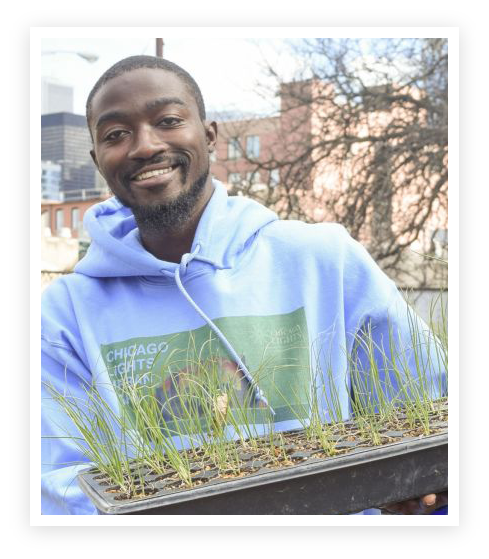Urban Farm

Community Engagement



Farming & Food Distribution
We’re a fully functioning farm—and we’ve got a bounty of produce to share. Our micro-enterprise not only provides healthy, local food to the community, but also gives teens and young adults invaluable work experience, building skills they’ll need to transcend systemic barriers in their education and careers. This helps make our community stronger! Support our young people by visiting our Farm Stand. Learn more.

Farmstand & Market Vouchers
High School Education
The Chi-Lights Farm Corps program teaches high school youth transferable job skills, provides insight into how food and food systems affect their daily lives, and imparts the skills to grow fresh produce for themselves and others.
Schedule
Location
Community Garden
Registration for 2024 community garden plots is now open. Only a few plots are left!
Plots available to individuals living or working within a five-block radius of the Farm at 444 W. Chicago. (east to LaSalle, south to Ohio, west to Halsted, north to Division)
We provide soil, water, and tools, along with a community of other gardeners who can provide guidance on growing—so don’t be afraid to try something new!
Gardeners are responsible for their plot, which includes choosing the crops to grow, watering, weeding, and harvesting produce.
The Chicago Lights Urban Farm relies on volunteer support. Community gardeners are asked to sign up for farm tasks and/or volunteer shifts totaling 5 hours for the season.
The fee is $120 per plot. If the fee is prohibitive, please inquire about a sponsorship. Chicago Lights appreciates plot sponsors who provide for a gardener in need.
Please contact Director Deja Stout with any questions: dstout@chicagolights.org.
Farmstand
Schedule & Location
June 29 – November 2, 2024
Chicago Lights Urban Farm
444 W. Chicago Ave., Chicago
Market Voucher Program
Everyone should have access to fresh, local food. Anyone who identifies as having a low income can shop at our weekly farmstand for free up to $25. If they are residents of Cabrini-Green, they are eligible to place an order through our Community Engagement Assistant and their orders will be delivered.
Sponsor Food for a Family
You can be a part of the Chicago Lights Urban Farm’s mission to alleviate food insecurity and support the local community. Sponsor a share of fresh, local produce for a family living in the Cabrini-Green neighborhood.

History
Overview
The Chicago Lights Urban Farm started as a community garden in 2003. It sprung out of a long-standing relationship between Fourth Presbyterian Church and residents of Cabrini-Green. The community garden, through a collaboration with Growing Power, was a ministry of the church until it became one of the four programs of Chicago Lights in 2009. The garden transitioned to an Urban Farm in 2010 as part of a community decision-making process. Community residents wanted more jobs for teens and young adults and more produce available.
Neighborhood Background
The Farm is located on the south end of the Cabrini-Green community in view of the original 1942 rowhouses. Cabrini-Green was a Chicago Housing Authority public housing complex that occupied close to 70 acres of land. The Rowhouses, named after St. Francis Cabrini, were built in 1942 and meant to house individuals with low incomes. In its heyday, the community had upwards of 15,000 residents.
This community demonstrates how social policies and a lack of city investment can affect the health of a community. Over the years, city divestment, social policies that separated families, and neglect led to poor living conditions. The neighborhood may have received more bad press in its day because of its location next to the high-income and predominately White neighborhood of the Gold Coast. But the Cabrini-Green community was also a place for families to grow, clubs to take place and community to be built. There are many examples of the positive aspects of the community that were present despite the lack of press these got in the public eye, including dances in the basements of buildings where people dressed their best, basketball tournaments, block party cookouts, church clubs for kids and teens, and much much more.
In 1997, the Chicago Housing Authority announced its Plan for Transformation with the goal of changing Cabrini-Green into a mixed-income community. Although the last high-rises were demolished in 2011, a population of residents still remain in the rowhouses (176 units that were renovated) and among many of the new buildings in this community.
The Chicago Lights Urban Farm land was secured by Fourth Presbyterian Church as a way to provide programming for residents, a space to bridge community, and a place to give voice to those who feel as though theirs do not matter. The land was sold to the CHA in 2013, but the Farm continues to work along-side the community to fulfill its shared goals.
Make a difference with Chicago Lights.
Volunteers make our life-changing work possible and help our students thrive.
Volunteer
Build brighter futures. Change lives. Volunteer with Chicago Lights!
Invest in changing lives with us.
Every dollar you give goes directly toward empowering youth in need.
